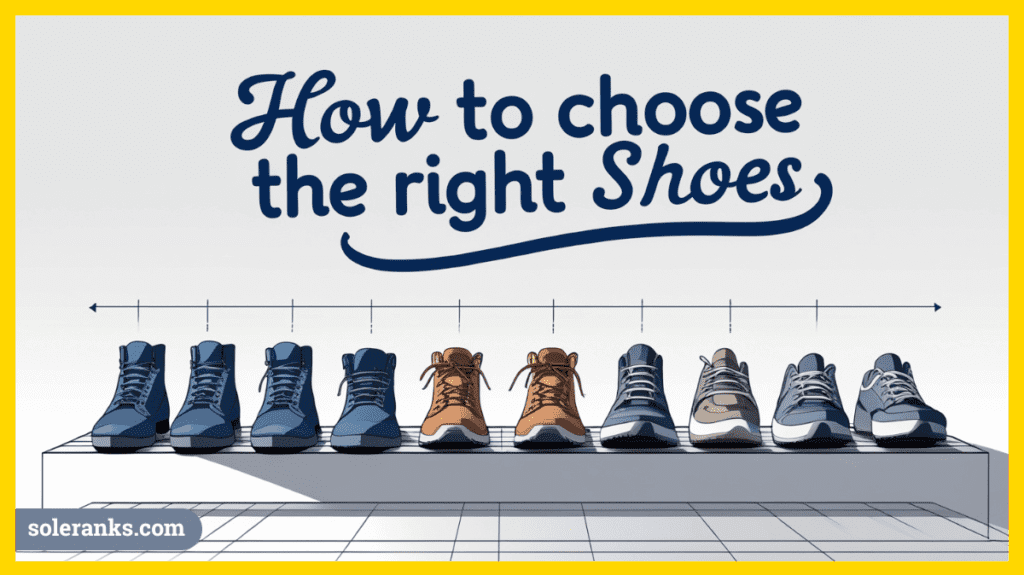Picking the right shoes can be super important! The right shoes keep your feet happy and healthy. This guide will help you choose shoes that fit well and look cool. Let’s explore everything about shoes together!

Contents
- 1 Overall Brand Comparison
- 2 Why Good Shoes Matter
- 3 Finding Your Shoe Size
- 4 Understanding Shoe Fit
- 5 Shoe Materials
- 6 Shoe Comfort Features
- 7 Shoe Stability and Support
- 8 Shoe Durability
- 9 Shoe Flexibility
- 10 Water Resistance
- 11 Shoe Soles
- 12 Choosing Shoes for Different Activities
- 13 Best Shoes for School and Everyday Wear
- 14 Best Athletic and Sports Shoes
- 15 Taking Care of Your Shoes
- 16 Conclusion
- 17 Frequently Asked Questions
Overall Brand Comparison
| Brand | Best For | Cushioning | Durability | Style | Breathability | Price Range |
| Nike | Sports, everyday | ⭐⭐⭐⭐☆ | ⭐⭐⭐⭐☆ | ⭐⭐⭐⭐⭐ | ⭐⭐⭐⭐☆ | $50-$120 |
| Adidas | Sports, fashion | ⭐⭐⭐⭐⭐ | ⭐⭐⭐⭐☆ | ⭐⭐⭐⭐⭐ | ⭐⭐⭐⭐☆ | $40-$100 |
| Vans | Skateboarding, casual | ⭐⭐☆☆☆ | ⭐⭐⭐⭐☆ | ⭐⭐⭐⭐⭐ | ⭐⭐⭐☆☆ | $45-$70 |
| New Balance | Running, wide feet | ⭐⭐⭐⭐⭐ | ⭐⭐⭐⭐⭐ | ⭐⭐⭐☆☆ | ⭐⭐⭐⭐☆ | $40-$90 |
| Converse | Fashion, casual | ⭐⭐☆☆☆ | ⭐⭐⭐☆☆ | ⭐⭐⭐⭐⭐ | ⭐⭐⭐☆☆ | $35-$60 |
| Timberland | Hiking, winter | ⭐⭐⭐☆☆ | ⭐⭐⭐⭐⭐ | ⭐⭐⭐⭐☆ | ⭐⭐☆☆☆ | $70-$120 |
| Skechers | Comfort, walking | ⭐⭐⭐⭐⭐ | ⭐⭐⭐☆☆ | ⭐⭐⭐☆☆ | ⭐⭐⭐☆☆ | $30-$70 |
| Crocs | Water, comfort | ⭐⭐⭐⭐☆ | ⭐⭐⭐⭐☆ | ⭐⭐☆☆☆ | ⭐⭐⭐⭐⭐ | $25-$50 |
| Under Armour | Sports performance | ⭐⭐⭐⭐☆ | ⭐⭐⭐⭐☆ | ⭐⭐⭐⭐☆ | ⭐⭐⭐⭐⭐ | $50-$100 |
| TOMS | Casual, summer | ⭐⭐⭐☆☆ | ⭐⭐⭐☆☆ | ⭐⭐⭐⭐☆ | ⭐⭐⭐⭐☆ | $30-$60 |
| HOKA | Maximum cushioning | ⭐⭐⭐⭐⭐ | ⭐⭐⭐⭐☆ | ⭐⭐⭐⭐☆ | ⭐⭐⭐⭐☆ | $70-$140 |
| Saucony | Running, support | ⭐⭐⭐⭐⭐ | ⭐⭐⭐⭐⭐ | ⭐⭐⭐⭐☆ | ⭐⭐⭐⭐☆ | $60-$100 |
| On Cloud | Lightweight running | ⭐⭐⭐⭐⭐ | ⭐⭐⭐⭐☆ | ⭐⭐⭐⭐⭐ | ⭐⭐⭐⭐⭐ | $80-$150 |
Why Good Shoes Matter
Wearing the right shoes helps you walk better and prevents foot pain. Bad shoes can give you blisters or make your feet hurt. Good shoes support your feet during activities like running, jumping, and playing sports.
How Shoes Affect Your Feet
Your feet have lots of bones, muscles, and nerves. The right shoes protect all these parts. When you wear good shoes, you can play longer without getting tired or hurt.
Finding Your Shoe Size
Measuring Your Feet
To find the right size, measure your feet in the afternoon when they are bigger. Stand on a piece of paper and trace around your foot. Measure the length from heel to toe. Also measure the width at the widest part.
Size Charts
| US Size | Inches | Centimeters |
| 1 | 8.25 | 21.0 |
| 2 | 8.5 | 21.6 |
| 3 | 8.75 | 22.2 |
| 4 | 9.125 | 23.1 |
| 5 | 9.5 | 24.1 |
Remember that different brands might fit differently. Some run small, and others run big.
Understanding Shoe Fit
A good fit is the most important thing when choosing shoes!
How Should Shoes Feel?
Your shoes should feel snug but not tight. You should have about a thumb’s width of space between your longest toe and the front of the shoe. Your heel shouldn’t slip out when you walk.
When to Try On Shoes
Try on shoes in the afternoon when your feet are slightly bigger. Wear the socks you plan to use with those shoes. Walk around the store to test them out.
Shoe Materials
Different materials feel different on your feet and last different amounts of time.
Common Shoe Materials
| Material | Pros | Cons | Best For |
| Leather | Durable, molds to foot | Can be expensive | School, special occasions |
| Canvas | Lightweight, breathable | Gets dirty easily | Casual wear, summer |
| Mesh | Very breathable, light | Less water-resistant | Sports, hot weather |
| Synthetic | Usually waterproof, affordable | Less breathable | Rainy days, outdoor play |
Material and Weather
Think about when you’ll wear your shoes. Mesh is great for hot days but bad for rain. Waterproof materials are perfect for puddle jumping!
Shoe Comfort Features
Cushioning
Cushioning is the soft part inside your shoe that absorbs shock when you walk or run. Good cushioning helps prevent sore feet after a long day of play.
Breathability
Breathable shoes let air flow to your feet, keeping them cool and dry. This helps prevent sweaty, smelly feet and blisters.
Weight
Heavy shoes can make your feet tired faster. Lighter shoes are usually better for running and playing. However, sometimes heavier shoes offer more protection for certain activities.
Shoe Stability and Support
Arch Support
Everyone’s foot has a curve called an arch. Some people have high arches, and others have flat feet. Good shoes support your specific arch type.
Types of Arches
| Arch Type | Description | Shoe Recommendation |
| High arch | Very curved foot | Cushioned shoes with flexibility |
| Normal arch | Medium curve | Most shoe types work well |
| Flat foot | Little to no curve | Shoes with stability features |
Ankle Support
Some shoes come up higher to support your ankles. These are good for activities where you might twist your ankle, like basketball or hiking.
Shoe Durability
What Makes Shoes Last?
Durability means how long shoes last before wearing out. Look at the stitching, materials, and how the sole attaches to the upper part of the shoe.
Signs of Quality Construction
Good shoes have even stitching with no loose threads. The sole is firmly attached, and materials feel sturdy. The insole (inside part) should not slide around.
Shoe Flexibility
Bend Test
Try bending the shoe. It should flex at the ball of the foot (where your toes bend when you walk). If it’s too stiff or bends in the middle, it might not be comfortable.
Why Flexibility Matters
Your foot bends when you walk and run. Your shoe needs to bend too! But too much flexibility might not give enough support.
Water Resistance
Keeping Feet Dry
Some shoes are made to keep water out. This is great for rainy days or playing in wet grass. Water-resistant shoes have special materials or coatings.
Waterproof vs Water-Resistant
Waterproof shoes keep all water out. Water-resistant shoes keep some water out but might get wet in heavy rain or puddles.
Shoe Soles
Types of Soles
The bottom of your shoe is super important! It helps with grip and comfort.
| Sole Type | Properties | Best For |
| Rubber | Excellent grip, durable | Everyday wear, sports |
| EVA foam | Lightweight, cushioned | Running, casual wear |
| PU (polyurethane) | Durable, flexible | School shoes, everyday |
| TPR (thermoplastic rubber) | Affordable, decent grip | Casual shoes |
Tread Patterns
The pattern on the bottom of your shoe helps with grip. Deep patterns are good for muddy or slippery surfaces. Flatter patterns are fine for indoor use.
Choosing Shoes for Different Activities
Best Shoes for School and Everyday Wear
| Brand | Model | Comfort | Durability | Style | Price | Overall Rating |
| Nike | Air Force 1 | ⭐⭐⭐⭐☆ | ⭐⭐⭐⭐☆ | ⭐⭐⭐⭐⭐ | $90 | 4.6/5 |
| Adidas | Superstar | ⭐⭐⭐⭐☆ | ⭐⭐⭐⭐☆ | ⭐⭐⭐⭐⭐ | $85 | 4.5/5 |
| New Balance | 574 | ⭐⭐⭐⭐⭐ | ⭐⭐⭐⭐⭐ | ⭐⭐⭐☆☆ | $80 | 4.4/5 |
| Vans | Old Skool | ⭐⭐⭐☆☆ | ⭐⭐⭐☆ | ⭐⭐⭐⭐⭐ | $60 | 4.3/5 |
| Skechers | Memory Foam | ⭐⭐⭐⭐⭐ | ⭐⭐⭐☆☆ | ⭐⭐⭐☆☆ | $50 | 4.2/5 |
| HOKA | Bondi | ⭐⭐⭐⭐⭐ | ⭐⭐⭐☆ | ⭐⭐⭐☆ | $120 | 4.7/5 |
Best Athletic and Sports Shoes
| Brand | Model | Sport Type | Cushioning | Support | Price | Overall Rating |
| Nike | Pegasus | Running | ⭐⭐⭐⭐⭐ | ⭐⭐⭐⭐☆ | $110 | 4.7/5 |
| Adidas | Ultraboost | Running | ⭐⭐⭐⭐⭐ | ⭐⭐⭐⭐☆ | $130 | 4.6/5 |
| Under Armour | Curry | Basketball | ⭐⭐⭐⭐☆ | ⭐⭐⭐⭐⭐ | $90 | 4.5/5 |
| Saucony | Ride | Running | ⭐⭐⭐⭐⭐ | ⭐⭐⭐⭐⭐ | $90 | 4.5/5 |
| On Cloud | Cloud X | Cross-training | ⭐⭐⭐⭐⭐ | ⭐⭐⭐⭐☆ | $130 | 4.6/5 |
| HOKA | Clifton | Running | ⭐⭐⭐⭐⭐ | ⭐⭐⭐⭐☆ | $130 | 4.8/5 |
Taking Care of Your Shoes
Cleaning Tips
Different materials need different cleaning methods. Canvas shoes can often go in the washing machine. Leather shoes need special cleaners and conditioners.
Making Shoes Last Longer
Rotate between different pairs instead of wearing the same shoes every day. Take off shoes properly instead of kicking them off. Keep them clean and dry.
Conclusion
Choosing the right shoes is about finding the perfect balance of fit, comfort, durability, and style. Remember that your feet are super important—they carry you everywhere! Good shoes help keep your feet healthy and pain-free.
Take time to try on different styles and brands. What works for your friend might not work for you. Your perfect shoes should feel great from the moment you put them on—no “breaking in” needed!
With the tips in this guide, you’re ready to find shoes that will keep you comfortable, support your activities, and look cool too!
Frequently Asked Questions
How often should I get new shoes?
Most kids need new shoes every 3-6 months because feet grow quickly. You also need new shoes if they get holes, the soles wear down, or they start hurting your feet.
Why do my shoes smell bad?
Shoes smell when sweat and bacteria build up inside. Wearing clean socks, letting shoes dry between wears, and using shoe deodorizers can help.
Can I wear the same shoes for all sports?
It’s better to have different shoes for different sports. Running shoes aren’t great for basketball, and soccer cleats wouldn’t work for tennis.
Why do my feet hurt in new shoes?
New shoes might hurt if they’re the wrong size, don’t match your foot shape, or lack proper support. Good shoes should feel comfortable right away.
How do I know if I need wide shoes?
If regular shoes feel tight on the sides of your feet or cause blisters on the edges of your feet, you might need wide shoes. A shoe expert can help you decide.
